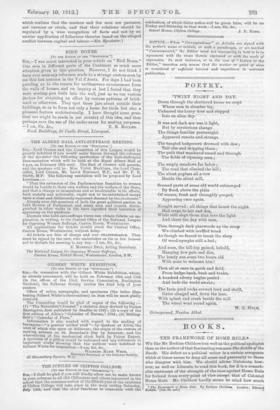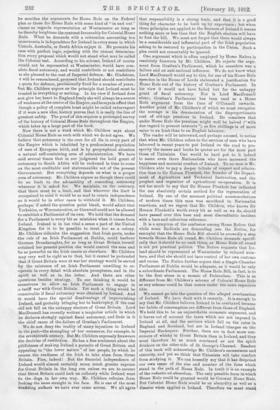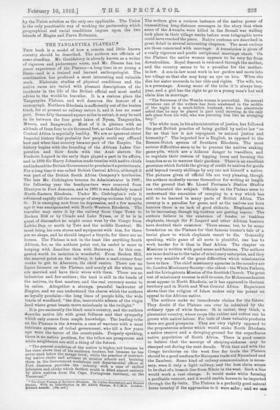BOOKS.
THE FRAMEWORK OF HOME RULE.*
WE like Mr. Erskine Childers less well as the political apologist than as the author of that fascinating romance The Biddle of tho Sande. His defect as.a political writer is a certain arrogance which at times seems to deny all sense and generosity to those who disagree with him. We should advise Unionists, how. ever, as well as Liberals, to .read this book, for it is a remark- able statement of the strength of the ease against Home Rule for Ireland frota every point of view except that of Colonial Home Rule. Mr. Childers hardly seems to mind how much • The Framework of Home Rule. By Erskine Childers. London: Edward Araeld. [12.. 6d. net.]
he scarifies the arguments for Home Rule on the Federal plan or those for Home Rule with some kind of "in and out" 'clause as regards representation at Westminster so long as he thereby heightens the contrast favourably for Colonial Home Rule. What he demands with a reiteration amounting toa -Inonornania is independence for Ireland in every sense in which Canada, Australia, or South Africa enjoys it. He presents his lease with perfect logic, rejecting with the utmost determina- tion every proposal which would not stand what may be called the Colonial test. According to his scheme, Ireland of course .would not be represented at Westminster, would have corn. olete fiscal autonomy, and would contribute or not contribute ts she pleased to the cost of Imperial defence. Mr. Gladstone, t will be remembered, proposed that Ireland should contribute quota for defence, provisionally fixed for a number of years ; tut Mr. Childera argues on the principle that Ireland must be trusted in everything or nothing. In his view if Ireland does mot give her heart to England freely she will always hen source
o f weakness at the centre of the Empire, and he says in effect that though a policy of complete trust might be called extravagant if it were a new idea, history proves. that it is really the line of tgreatest safety. The proof of this requires a prolonged survey of the history of Colonial Home Rule throughout the Empire, -which takes up a large part of the book.
Now there is not a word which Mr. Childers says about Colonial Home Rule as such with which we do not agree. We believe that autonomy is the cure for all ills in every part of t he Empire which is inhabited by a predominant population o f men of 4uropean birth, and is by geographical situation a natural self-containing area of administration. We have said several times that in our judgment the bold grant of .autonomy to South Africa will be reckoned in time to come as the most creditable and statesmanlike act of the present 'Government. But everything depends on what is a proper area of autonomy. Mr. Childers argues as though there could be 110 limit to the advisability of conceding autonomy -wherever it is asked for. We maintain, on the contrary, that there must be a limit, and that wherever the limit is recognized to exist it would be as mad to create independence as it would be in other cases to withhold it. Mr. Childers, ,perhaps; if asked the question point blank, would admit that Yorkshire, or Worcestershire, or Cornwall could not be allowed t o establish a Parliament of its own. We hold that the demand or a Parliament is every bit as mistaken when it comes from Ireland. Ireland is in too vital a sense a part of the United Kingdom for it to be possible to treat her as a colony. Mr. Childers ridicules the suggestion that Irish ports, under the rule of an Irish Parliament at Dublin, could harbour Gorman Dreadnoughts, for BO long as Great Britain herself retained her present position she would control the seas and lbe as powerful on the Irish coasts as elsewhere. Mr. Childers may very well be right, as to that, but it cannot be pretended that if Great Britain were at war her strategy would be served by the existence of an Irish Parliament unwilling to co- operate in every detail with absolute promptness, and in the spirit as well as in the letter. And there are, other questions besides strategy. To our thinking it would be anonstrous to . allow, an Irish Parliament to engage in a tariff war with Great Britain. 'Yet such a thing would be .conoeivable if fiscal autonomy were obtained by Ireland. And it would have the special disadvantage of impoverishing Ireland, and probably bringing her to bankruptcy, if the cost (Ea not fall on the unhappy electors of Great Britain. . Lord ldacDonnell has recently written a magazine article in which be declares strongly against fiscal autonomy, and finds in it the chief cause of the. failure of Grattan's Parliament.
We do not deny the 'reality of many injustices to Ireland in the past--the strangling of her commerce, for example, in the seventeenth century. But Mr. Childers expressly forswears the doctrine of restitution. He has a fine sentiment about the pitifulness of making Ireland a parasite of Great Britain and appealing to "the lower nature" of her people, by which he aneans the readiness of the Irish to take alms from Great Britain. Fine, indeed ! But the financial independence of Ireland would almost certainly mean much greater expense for Great Britain in the long run unless we are to assume that Great Britain could look on callously while Ireland went to the dogs in her own way. Mr. Childers refrains from looking the issue straight in the face. He is one of the most 'confiding authors we have ever come across. We all agree that responsibility is a strong tonic, and that it is a good thing for character to be built up by experience ; but when these principles are applied to the finances of Ireland it means nothing more or less than that the English electors will have to foot the bill. We must not forget that there would always be a considerable and influential part of the Irish population asking to be restored to participation in the Union. Such a plea could not conceivably be ignored.
One argument which is often employed by Home Rulers is resolutely forsworn by Mr. Childers. He rejects the argu- ment from Grattan's Parliament, which he considers was a failure and an anti-national influence. We do not know what Lord MacDonnell would say to this, for one of his Home Rule speeches in the House of Lords elaborated a justification for Home Rule out of the history of Grattan's Parliament. In his view it would not have failed hut for the unhappy grant of fiscal autonomy. Nor is Lord MacDonnell alone; Grattan's Parliament has been used as a Home Rule argument from the time of O'Connell onwards. Another point of Mr. Childers's of which we must recognize the courage is his denunciation of the disproportionate cost of old-age pensions in Ireland. He considers that under Homo Rule the pensions might well be halved (" with due regard to present interests "), as five shillings is of more value to an Irish than to an English labourer.
The reader will be interested, and perhaps amused, to notice that when Mr. Childers refers to the services of men who have laboured in recent years to put Ireland on the road to pro- sperity the names and hooks he quotes are for the most part those of Unionists. One would be bard put to it indeed to name even three Nationalists who have increased the happiness and material comfort of Ireland. To no man is Mr. Childers able to pay a deeper tribute of respect and admira- tion than to Sir Horace Plunkett, the founder of the Depart- ment of Agriculture and Technical Instruction, and the prophet and organizer of agricultural co-operation. It is not too much to say that Sir Horace Plunkett has indicated the one absolutely certain method for the regeneration of Ireland. By one of the meanest political accommodations of modern times this man was sacrificed to Nationalist exactions, and we regret that Mr. Childers, who knows Sir Horace Plunkett's worth every bit BB well as we do, should have passed over this base and most discreditable incident with a bare and colourless reference.
It is a symptom of the confusion among Home Rulers that while some Radicals are demanding (see the Netion, for example) that the Home Rule Bill should be avowedly a step towards Home Rule all round, Mr. Childers demands specifi- cally that it should be no such thing, as Home Rule all round is not yet practical polities. The Nation suggests that Ire- land should be represented at Westminster by reduced nurn- hers:and that she should not have control of her own customs and excise. The Nation further argues that a Single-Chamber Parliament at Dublin would be adequate, as it would be only a subordinate Parliament. The Home Rule Bill, in fact, is to be the first stone in a mosaic of Federalism. This is as different from Mr. Childers's scheme of Colonial Home Rule as any scheme could be that comes under the same capacious title.
We cannot go into the question of the alleged overtaxation of Ireland. We have dealt with it recently. It is enough to say that Mr. Childers believes Ireland to be overtaxed because her habits of consumption are different from those of England. We bold this to be an unjustifiable economic argument, and it leaves out of account the. taco which are not imposed in Ireland at all, and the services which fall on the rates in England and Scotland, but are in Ireland'oharges on the Imperial Exchequer. Further, there are in fact more con- sumers of whisky in Great Britain than in Ireland, and they must therefore be as much overtaxed as are the spirit drinkers on the other side of St. George's Channel. Readers of this book will acknowledge Mr. Childers'e earnestness and sincerity, and yet we think that Unionists will take comfort from studying it. We can honestly say that it has deepened our own sense of the size and number of the lions which
stand in the path of Home Rule. in truth it is an example of the reduotio ad abintrdum. The only possible form in which
Home Rule could be granted would be Colonial Home Rule. But Colonial Home Rule would be an absurdity as well as a disaster when applied to Ireland. Therefore we must stand by the Union solution as the only one applicable. The Union urio is the only practicable way of working the partnership which the geographical and racial conditions impose upon the two












































 Previous page
Previous page